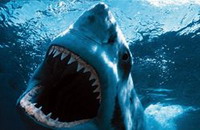Shark cage-diving industry finds its capital in South Africa
Clear waters and a high concentration of great white sharks makes this sleepy fishing town the capital of cage-diving - plunging underwater in a sturdy metal basket for a close-up look at one of nature's greatest predators.

But the multimillion dollar (euro) industry is increasingly the target of critics who say it is teaching sharks to associate people with food by luring them to boats with hunks of bait.
So local shark tour operators hosted a Great White weekend festival to reassure locals that there is no link between attacks on humans and the industry that has transformed their town into a draw for adrenaline junkies.
Suspended in underwater cages and gasping with amazement from boats, locals were treated at cut-rate prices to the spectacle of lithe creatures gliding elegantly through the lucid waters of Shark Alley, named for its unusual density of great white sharks attracted to a nearby colony of 40,000 seals.
On shore, children donned cardboard shark hats and watched a local theater company perform a shark-themed play, while conservationists sought to educate visitors about the mighty predator.
Gansbaai - or Goose Bay - is an unassuming town of a few hundred people about two hours from Cape Town. It lacks the chic stores and smart hotels of nearby Hermanus, famed for its whale watching.
But Gansbaai claims that its great whites - the only type to survive in the frigid waters here - are more accessible than those at resort areas in California and Australia, which also have thriving shark tourism industries, because they are so close to the shore.
But the industry has a bad image. One person is killed by a shark every two years in South Africa. Experts say the number of shark-related incidents will probably increase because more people are surfing, kayaking and swimming than before, but many locals say that the cage-diving industry is to blame.
A report last year from experts at the World Wildlife Fund South Africa and government conservationists said there was no evidence linking attacks on humans and the industry. But it did warn tour operators to stick to the rules and not to provoke sharks into aggressive behavior.
Operators attract sharks - which have a powerful sense of smell - with a mixture of blood and fish remains, a practice known as "chumming," and encourage them to stay near the boat by dangling large fish in the water. In Gansbaai, eight companies have government permits to operate cage-diving and shark-spotting tours. A code of conduct states the animal must not be harmed or rewarded with food if itcomes to the boat.
Operators acknowledge that this does happen sometimes due to the shark's speed and stealth and the crew's carelessness.
"Watch the bait! watch the bait!" skipper Johannes van der Merwe yelled repeatedly to his crew on a trip Saturday, when sharks around 3 meters (10 feet) long came within touching distance of the boat in search of a tasty bit of fish.
It was an awe-inspiring sight, and a far cry from the terror invoked by "Jaws," the 1975 film that portrayed the great white as an indiscriminate killing machine. Even so, the close encounter proved too much for a cage occupant who was copiously sick after he emerged from just under the water's surface.
There are few precise figures on the number of great whites left in the world. Estimates talk of around 1,200 off the South African coast, although these are unreliable because of the vast distances the sharks swim.
South Africa was the first country in the world to declare the great white a protected species in 1991 - 13 years before international conservation bodies declared it to be endangered.
Alison Kock, with the University of Cape Town's shark research unit, says there should be independent monitors on all the cage-diving vessels to ensure they do not feed the sharks or tease them into coming too close.
"The problem is with high expectations that tourists have," Kock said in an interview. "They are not happy with just seeing the sharks, but they want them to leap out of the water or go right against the cage."
Kock said the shark tour operators help dispel myths that have plagued the great white since "Jaws" and are helping to educate the public that sharks are far more at risk from humans - pollution and fishing nets - than the other way round.
Although naturally aggressive, great white sharks are intelligent and do not regard swimmers and surfers as natural prey, she said. And she said most attacks were probably the result of a chance encounter rather than the desire to kill.
"They are very confident, curious animals," Kock said. "If they don't know what something is, they give an exploratory bite or nudge."
Kock said there is much room for improvement in the business, but she is generally supportive because the industry encourages environmental awareness and helps promote research into a creature about which relatively little is known.
"South Africa is one of the best places in the world to see great white sharks, so why shouldn't people be allowed to see them," she said.
Subscribe to Pravda.Ru Telegram channel, Facebook, RSS!


